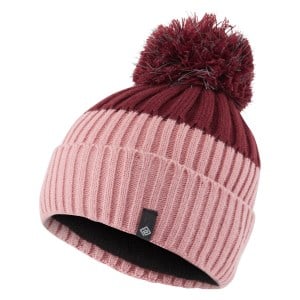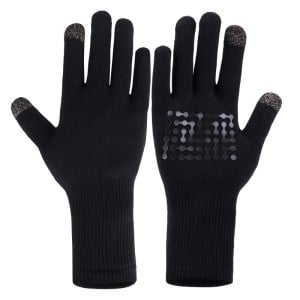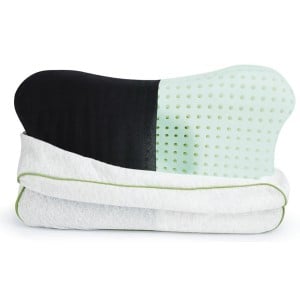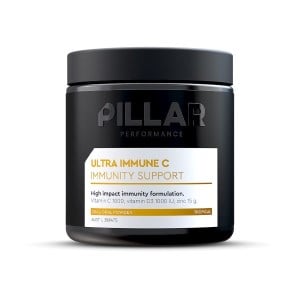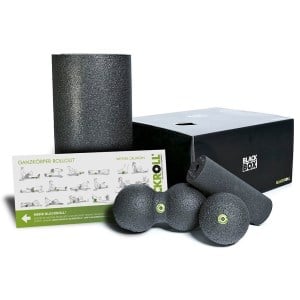Will Running In The Rain Make You Sick?
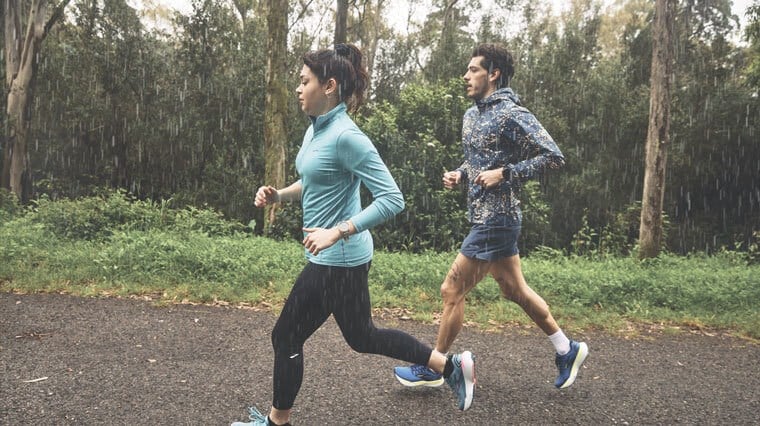
Ever see a runner in the rain and think, what a legend?
With flu season upon us (usually May to September in Australia), you might be reassessing your running routine or tossing up whether or not to sign up for a winter marathon, particularly when the rain clouds roll in.
But did a little rain ever hurt anybody, or are you just looking for an excuse to hibernate away from the chill?
Myth: The rain will make you sick
Being wet will make you cold but know that it’s the cold, not the rain itself that makes you more susceptible to picking up common cold causing viruses, with rhinoviruses being the most common.
Being exposed to cold - especially in reference to your upper airways and nose - may weaken your immune system’s ability to fight off viruses. When it comes to runners, boosting your immune system can be a bit of a juggling act.
Running and your immune system
At the right balance, performing cardio exercises like running regularly at moderate levels (for less than 1 hour at a time) strengthens your immune system and the act of moving itself will increase your body temperature, improving your protection.
However, neglecting to recover properly and overtraining can temporarily impair your immune system as your body under stress releases the hormone cortisol and provides a window for viruses to make a home of your body (up to 72 hours post-workout).
Does a runny nose and sneezing mean you're sick?
Snot (or nasal mucus) gets a pretty bad wrap! Yes, a runny nose is a symptom of the common cold but it’s actually a sign that your immune system is working to rid your body of infection. Like your skin, mucus is one of the first lines of defence – a gloopy barrier rich in antibodies to filter out and expel foreign bodies – bacteria, dust, smog, smoke, cat hair, you name it.
You swallow mucus all the time without even knowing it, but this helps lubricate and moisten sensitive tissues like your trachea, saving you from that dry and scratchy feeling in your throat. Swallowing mucus also transports any nasty bacteria or viruses caught in it into your stomach, where the acidic environment can render them unharmful.
Sneezing is another common cold symptom that is beneficial to your health - with a purpose to expel irritants to the mucous membranes of your nasal cavity. This includes the build-up of virus-carrying mucus in your nasal passages when you're fighting off an infection, helping relieve pressure.
However, being sick is not the only reason why you may have a runny nose or are sneezing.
If you're not sick, then why is your nose running like a tap?
Exposure to cold, dry air can cause weird symptoms like a drippy nose as your respiratory system produces more mucus to humidify and warm cold air, protecting your delicate lung tissue from irritation.
In this case, you don’t necessarily have a virus - your nose and mucous membranes are just doing their job in ensuring healthy respiratory function. But be aware that the cold air can make it trickier for your body to flush out viruses and bacteria as your mucus thickens and nasal passages become congested, blocked or stuffy.
A runny nose and sneezing may also be a sign of environmental allergies. Consult your doctor if you believe this may apply to you.
How can you catch the common cold?
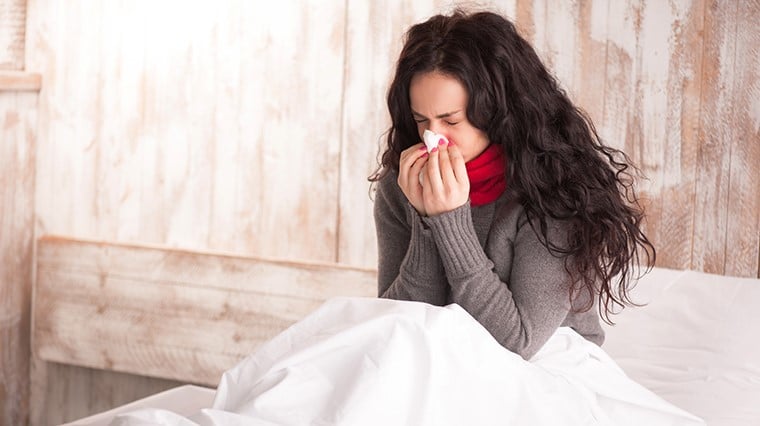
On its own the cold weather can’t magic up a virus inside you – it’s more complicated than that.
Common cold viruses can be contracted by contact with infected people and then by touching your eyes, nose or mouth (mucous membranes). You can also become infected if you inhale tiny droplets from a contagious person that’s coughed or sneezed close by, even if it was several hours before.
Depending on the specific virus, temperature, humidity and surface type, common cold viruses can survive a significant period outside the body on commonly touched surfaces like doorknobs, taps, light switches, cash and toys.
How can you protect yourself and others during flu season?
It’s important to take preventative measures all-year round to reduce your risk of infection, but even more so in the colder months, when we have a tendency to bundle up indoors in close proximity to others.
Stay warm & use a humidifier
Both cold, wintry air and indoor heating can cause a drop in humidity, which creates ideal conditions for viruses to proliferate and spread.
You should protect yourself from the cold, but be aware that turning up the heating can dry out your virus-fighting mucus. This in combination with inadequate ventilation may put you at greater risk of the common cold and influenza, a less common but more severe condition.
Using a humidifier can help reintroduce moisture in the air. Turn it on before you go to sleep and you’ll be less likely to wake up with a parched throat or dry, irritated nose.
Other methods to stay warm other than indoor heating include wearing light layers (instead of one bulky layer) to help hold your body warmth against your skin, and topping off your wardrobe with a beanie and gloves. Apparel and accessories that are made of Merino wool or a blend are ideal for their naturally thermal properties.
Prioritise 7 - 9 hours of quality sleep
During sleep, your body releases infection-fighting cytokines - specialised proteins that play a role in supporting your immune system. Sleep deprivation can both increase your risk of infection and slow down your recovery.
Check out How Quality Sleep Makes You A Better (And Happier) Runner and 7 Sustainable Tips To Improve Your Sleep to learn more about the importance of sleep, and the healthy sleep habits that can help you achieve it.
Cover your mouth when coughing and sneezing (but not with your hands)
Your hands are one of your most useful tools – whether chopping veggies, hugging a coffee mug, using your phone or lacing up your running shoes - so it’s well-worth keeping them free of cold-causing viruses.
Sneezing can provide a feeling of relief, however if you have the common cold even just one sneeze may contain thousands of virus-carrying droplets that can infect others. When you need to, cough or sneeze into a tissue and bin it, or into your inner elbow that’s less likely to come into contact with other people or surfaces.
Wash your hands

Washing your hands regularly with soap and water (particularly before handling food, eating or after blowing your nose) keeps germs under wraps and prevents you from becoming infected with or spreading common cold causing viruses.
Disinfectant alcohol wipes or hand sanitiser can be used in a pinch – an easy option for when you’re stuck in close proximity to people like at your workplace, movie theatre, on public transport or your next marathon.
Stay hydrated to help your immune system
Staying hydrated by drinking water is an important step in your winter and all-year round survival kit. In terms of supporting your immune system, being well-hydrated helps prevent your mucus from drying out so it can continue to trap foreign invaders like bacteria and viruses. Mucus will also help cleanse out nasal passages before any foreign bodies can reach your lungs.
Keeping a water bottle convenient and close at hand - whether you're exercising, at home or at work - can help remind you to drink up. You can increase the immune-boosting benefits of your water by infusing it with lemon or orange slices that are rich in vitamin C.
Boost your vitamin C
Vitamin C (also referred to as ascorbic acid) is a powerful antioxidant and is essential to the health and functioning of your immune system. It may not prevent the transmission of a virus, but studies suggest it may help reduce cold symptoms in both severity and duration.
The human body can't produce vitamin C. Vitamin C can be sourced from a balanced nutrition that includes citrus fruit like oranges as well as other fruits like apples, kiwifruit and strawberries. Vegetables including broccoli, brussel sprouts, cauliflower, capsicum, tomatoes and potatoes are also rich sources of vitamin C.
If you find it challenging to gain adequate vitamin C from nutrition alone, a supplement may be beneficial. Pillar Performance Ultra Immune C Training Advantage Power is a research-based supplement designed with the needs of athletes in mind during performance and recovery. It contains a high strength dose of vitamin C (1000 mg), vitamin D3 (1000 IU) and zinc to support your health and wellbeing.
Get a healthy dose of sun
Studies show that gaining adequate vitamin D - the 'sunshine' vitamin - can help strengthen your immune system and reduce risk of infection with the common cold and other respiratory illness.
Vitamin D is sourced from UV radiation from the sun, supplements and foods high in vitamin D including salmon, mushrooms exposed to sunlight/ultraviolet light, fortified milk and egg yolk.
It's particularly challenging to get enough vitamin D from the sun during the colder seasons. However, be wary that increased sun exposure can also make you more susceptible to skin cancer and there is a limit to how much vitamin D your body can absorb at a time. Check out the Cancer Council website for expert guidance on sun safety.
Stay at home if you're sick & de-stress with light exercise

If you’re sick, stay at home to reduce risk of exposure to other people - cuddle up with a juicy book, have a warm bath to relieve symptoms like congestion, or de-stress your way as your body fights off the bug. You can enjoy yoga, resistance band exercises, foam rolling or other low-intensity activity if only experiencing mild symptoms, but listen to your body and stick to light sessions.
Even light exercise can increase blood circulation, helping infection-fighting white blood cells travel around your body, while releasing feel-good endorphins. You may also enjoy a walk outdoors to nourish your mood, mind and body with nature.
-
Blackroll Loop Band Set - Fabric Resistance Band - 3 Band Set$59.90
-
Blackroll Blackbox Set - Foam Roller & Massage Ball Set$99.90
Can you go for a run with a cold?
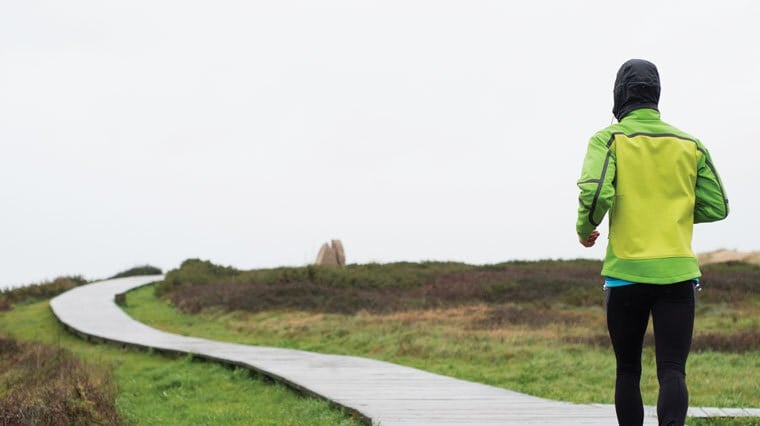
That depends. Ideally, recovery should be your priority and that includes eating balanced, vitamin-rich nutrition and relaxing as stress, whether mental or physical, can impair your immune function.
However, if you don't want to miss out on hitting the pavement, ask yourself...
Are your symptoms above the neck or below the neck?
Generally speaking, above the neck symptoms only like runny nose, sneezing or a minor sore throat tend to indicate a less severe condition, so it's probably safe to go for a run. If there's any doubt, please check with your doctor to be sure.
On the flip side, below the neck systems such as tight chest, aching muscles, diarrhoea, vomiting as well as difficulty breathing or fever, mean running and increased exposure to the elements will put you at greater risk of a more severe respiratory infection and could jeopardise your recovery.
Adjust your runs by lowering the intensity
You can put your feet up guilt-free until you’re feeling 100% and the bug is busted from your system, but if you do choose to run with minor symptoms or during the days following your recovery, adjust your usual routine.
Temporarily avoid high intensity sessions, run at a slower, recovery pace and cut back the distance. This is an ideal time to run pressure-free by feel rather than tracking your performance with a sports watch.
Alongside enjoying the positive benefits of running on your mental health to help ward off seasonal depression (seasonal affective disorder), walking, jogging or light running may open up your airways to provide relief of nasal congestion.
Dress for the conditions
If you choose to run in the rain or cold, protect yourself from the elements. Check out What To Wear Running In The Cold & Rain which provides advice on your cold weather running clothing layer by layer.
This will help you exercise more comfortably and confidently during the chiller months, while lowering the risk of your immune system becoming compromised due to cold exposure.
-
Ronhill Tech Hyperchill Mens Running Jacket$189.99 $99.99
-
Ronhill WindstopperTech Gore-Tex Womens Waterproof Running JacketFree Delivery in Aus$299.95 $228.99
Is there a vaccine or cure for the common cold?
Currently there’s no cure or vaccine for the common cold, only treatment to relieve symptoms. For healthy adults, normally it will naturally resolve within 7 – 10 days. Antibiotics aren’t the answer, as the common cold is caused by viruses, not bacteria and using them unnecessarily will decrease their effectiveness in other cases when they would otherwise be beneficial.
Check in with a medical professional if you’re concerned, are in a high risk group (e.g. child, pregnant, elderly or have an immune system impairment) or are experiencing more severe symptoms such as cough, shortness of breath, headaches, fatigue, muscle aches, fever or shaking chills that may indicate influenza.
Unlike the common cold there is an annual vaccine for influenza. Consult a healthcare professional for current vaccination advice to help protect yourself and your family this flu season.
Happy running!
